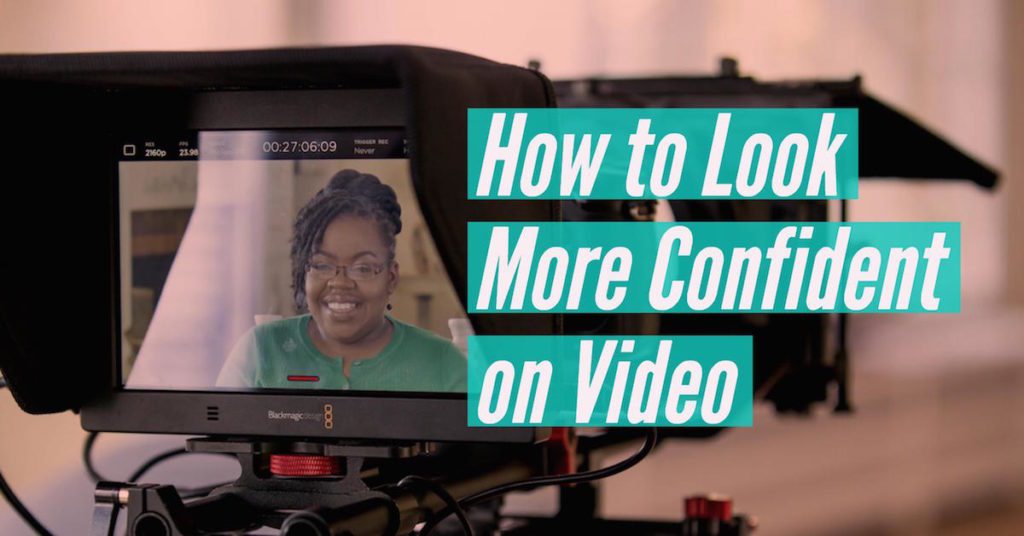How To Look More Confident On Video
by MARCUS KRIEG, on Jan 26, 2015 10:22:00 PM

Can you feel it?
Sweat pooling in your hands...
The “thump thump thump” of your heart…
A sense of foreboding, like you’re waiting outside the principal’s office.
If you’re new to presenting on camera, you may be feeling a little panicked, but guess what:
That’s normal.
There’s something about being on camera that makes even the most confident extrovert feel sheepish.
Fortunately, it doesn’t have to be that way.
You can look more confident on video by following a few simple tips, which I’ll be sharing with you in this post.
Free Bonus: Discover how to create videos that generate ROI with this free, 5-part video course. Click here for instant access!
Camera Confidence Tip #1: Find Your Calm
Nobody enjoys the extreme butterflies that you get before speaking on camera.
Not only does it increase your stress level, but the hormones that flood your body when you're nervous can sap your energy and cloud your thinking...not good when you’re trying to clearly communicate your ideas.
The good news is that it gets easier the more you do it, but the bad news is it takes a lot of practice before you can become truly comfortable.
In the meantime, the most important thing you can do is to remain calm and relaxed as long as possible.
Easier said than done, right?
What works for me:
I’ve found that listening to music or working on an unrelated activity is a great way to engage your mind. I know other people who practice meditation, which is something I'm currently working on, but I’ve never been able to quiet my thoughts enough to experience those benefits.
Camera Confidence Tip #2: Get Psyched
While it’s important to remain calm and grounded prior to your shoot, you definitely don’t want to be in full-on zen mode when the cameras turn on.
While most people focus on the ten pounds the camera adds, many people don’t realize that the camera takes about 20% of your personality away. So use those final moments to get psyched and bring your energy levels back up.
You should add more energy and personality than you think you need. It may feel like you're going "over-the-top," but that's much better than boring. Nobody buys from boring people.
Have fun with it and try not to take yourself too seriously.
Worst-case scenario, you have some funny outtakes for your blooper reel. Best-case scenario, you create an engaging video that communicates your passion for the topic, which helps builds trust.
What works for me:
Everyone gets psyched a little differently, but here are some strategies that have worked for me in the past:
- Speaking loudly, which helps project confidence
- Reading children's books out loud to practice speaking with emotion
- Telling stupid jokes and relying on the crew for pity laughs (my favorite)
Experiment with it and find out what works best for you.
No matter what you try, your video crew should have the good sense to let you work through your nerves before turning the camera on.
Camera Confidence Tip #3: Look Sharp
 There’s no faster way to boost your confidence than to pamper yourself a bit before the shoot.
There’s no faster way to boost your confidence than to pamper yourself a bit before the shoot.
It seems really obvious, and it probably is, but it’s also easy to forget that looking your best isn’t just for your audience.
The biggest benefit to looking good is feeling good. When you think you look good, you’ll naturally feel more confident, and this will help your personality shine through on camera.
To you, that might mean:
- Getting a new haircut
- Wearing your favorite outfit
- Buying a new tie or shirt
At WireBuzz, we often bring a makeup artist with us on set. And while it does help improve the visual quality of the video, the biggest value it provides is confidence. It may seem like a small thing, but the outcome is a significantly more effective filming session.
A little extra confidence can go a long way.
Camera Confidence Tip #4: Don’t Procrastinate On Prep
There’s nothing worse than shooting a video when you’re completely unprepared.
Most of us talk faster than we think, especially when we’re nervous.
What typically happens in those situations is that you end up talking around the idea or make lots of vocal mistakes (“umms,” “uhhs,” “likes,” and “you knows”).
Not only does that make it more difficult for your film crew to produce a great video, but you also run the risk of losing your audience. It’s very easy for people to hit the “back” button when you don’t get to the point.
Plus, people respect strong communicators more than poor communicators. If a particular video is a prospect's first interaction with your brand, you want that first impression to be strong because they'll associate the quality of your brand with the quality of your content. Prepare early and often to build and protect your reputation.
Now, that doesn’t mean you should write a full script for every video you create. On the contrary, most of us aren’t stage-trained and are quite bad at speaking naturally when trying to remember a script.
What works for me:
Organize your thoughts into bullet points and practice talking through that outline in a variety of different ways. This will make your videos more authentic and engaging, which helps you build relationships with your audience. Shoot multiple takes from different angles and let your editors make a great video by combining the best parts together. If you do this right, nobody will know it took more than one take.
It’s also important to remember tip #1 and remain calm. For most of us, that means you shouldn’t practice your speech in the hour leading up to your filming session, since it can increase your anxiety levels and drain your energy.
If you prepare early and often, you won’t need to cram right before your shoot.
Camera Confidence Tip #5: Don’t Get Down On Yourself
Easier said than done, I know, but that doesn’t make it less true.
Some common sources of self-criticism include:
- Your appearance
- Your voice
- Mistakes
But let me share a secret: your audience doesn’t know any better.
People don’t really care if you look like a model, but you should look good for you (see tip #3). Follow good grooming habits and dress appropriately for your body type. Don’t overthink your appearance, because your audience won’t.
When it comes to hearing your own voice, I feel your pain. I hate hearing my voice recorded.
Remember that everyone hates their voice because it tends to sound a little higher and “squeakier” than we're used to.
Your voice really only sounds strange to you. To everyone else, it’s normal. As long as your audio equipment is good and you’re communicating your ideas clearly and succinctly, your audience won’t notice your voice much.
Mistakes, on the other hand, are a little harder to let go of. It’s normal to be your own worst critic. But trust me, it’s much more important to sound authentic than to sound polished.
That said, don’t take this to extremes and forget tip #4. You should still be well-prepared.
What works for me:
I’ve always found that it helps to remember your audience expects you to sound human, and humans make mistakes. Being "too perfect" can actually work against you. There are no perfect takes.
Conclusion
I don’t expect you to be psyched for your next appearance on camera, but I hope that you find these tips helpful for improving your comfort level and screen presence.
It takes practice before you’ll feel truly comfortable on camera. But in time, you’ll be killing it without a second thought.
In the meantime, follow these tips and you’ll at least appear more confident and poised when your audience watches the final video.
Did I Miss Anything?
If you’d like to share some of your own tips for appearing more confident on camera, please let us know in the comments below.
